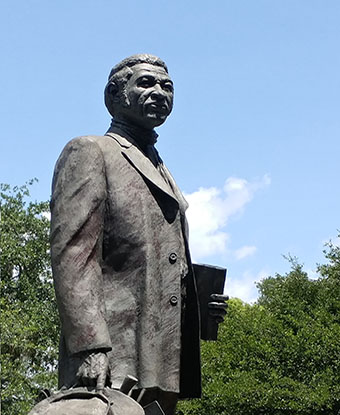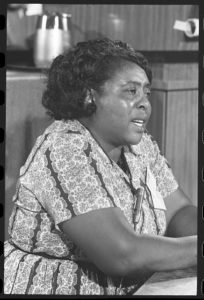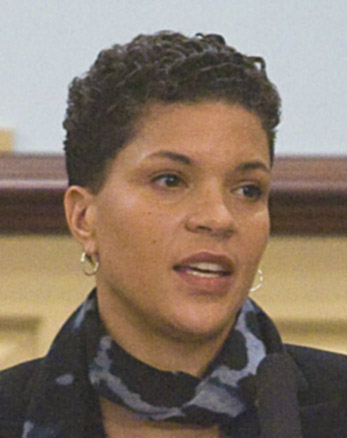St. Patrick took the Gospel to the country of Ireland
Podcast: Embed
Subscribe: RSS
Podcast: Embed
Subscribe: RSS
Every Black History Month we see a million memes, quotes, and images of Black people who have played an important role in shaping the story and lives of black people in America. We have heard about Martin Luther King Jr., Harriett Tubman, Frederick Douglass, and Rosa Parks more times than we can count. If we’ve grown up with good black history education which is rare in these yet to be United States of America, then we might know Booker T. Washington or Maya Angelou. We know there is an active attempt to publicly whitewash black history as though the systemic destruction, repression, and marginalization of our history wasn’t enough. As a result it becomes more important than ever to teach and tell Black History.
But in an attempt to reclaim our history, let us not forget the key role faith played in the lives of so many of our black leaders. There is a reason why belief in God and practice of faith were so key in the lives of many (but not all) people we talk about during Black History Month. So let’s lift up the faith of our black heroines and heroes this month as we continue to live out our own faith. Below are just some notable examples of historical moments and key black leaders who were influenced by their faith.
 Denmark Vesey
Denmark Vesey
Denmark Vesey was an abolitionist and former slave who planned and organized an armed slave rebellion to free the slaves in Charleston, SC. Charleston was the largest slave trading port in the United States during the early 1800s. He was the slave of a ship captain who won the lottery and paid for his own freedom with his earnings, but was not able to pay for his family’s freedom. As a result he became intent on ending the institution of slavery itself. Vesey was a worshipper and small group teacher at the African Church which became Mother Emmanuel AME Church, and his faith informed his advocacy for abolition.
He was inspired by the Haitian revolution and planned to flee to Haiti with the freed slaves after the rebellion. He inspired other abolitionists such as Frederick Douglass, David Walker, and Harriet Beecher Stowe. It is well noted that the abolition of slavery was a result of the work of Christian abolitionists.
The Christianity of Vesey and David Walker after him did not advocate for passive waiting to slavery to end. As he read Isaiah, Amos, and especially Exodus he were convinced that armed rebellion could be used by God to bring freedom to enslaved Africans. He began to preach a radical liberation theology from the Old Testament almost exclusively as he prepared for rebellion. Denmark Vesey resurfaced as a popular figure in recent years in the aftermath of the horrendous shooting at Mother Emmanuel AME Church in 2016.
 Fannie Lou Hamer
Fannie Lou Hamer
Fannie Lou Hamer was the founder and vice-chairperson of the Mississippi Freedom Democratic Party, which successfully unseated the all-white Mississippi delegation at the Democratic Party’s convention in 1968. This and other efforts earned her the title “First Lady of Civil Rights.”
In 1962, Fannie Lou became involved with the Civil Rights Movement when the Southern Christian Leadership Conference and the Student Nonviolent Coordinating Committee held a meeting in Ruleville, Mississippi. She and 17 others went to the county courthouse and tried to register to vote. Because they were African American, they were given an impossible registration test which they all failed. Fannie Lou’s life became a living hell. She was threatened, shot at, cursed and abused by angry mobs of white men including being beat almost to death by the police and imprisoned in Mississippi in 1963 for registering to vote.
Fannie Lou Hamer often sang spirituals at rallies, protests, and even in jail. Her faith in God is what she felt carried her through those difficult experiences. She quoted the Bible to shame her oppressors, encourage her followers, and hold her ministerial colleagues in the SCLC and SNCC accountable. She was a devout member of William Chapel Missionary Baptist Church, and let her faith permeate everything she did.
 Michelle Alexander
Michelle Alexander
Michelle Alexander, JD is a civil rights lawyer and advocate, a legal scholar and the author of the New York Times best seller “The New Jim Crow: Mass Incarceration in the Age of Colorblindness.” The book helped to start a national debate about the crisis of mass incarceration in the United States and inspired racial-justice organizing and advocacy efforts nationwide.
Alexander performed extensive research on mass incarceration, racism in law and public policy, and racial justice to write her book published in 2010. She has lectured and taught widely on her work as a professor of law and religion at Stanford University, The Ohio State University, and Union Theological Seminary. The New Jim Crow became a foundational text for many of the reforms being advocate for by various organizations involved in the recent push for criminal justice reform and the movement for black lives.
Alexander was driven by her faith to advocate for justice system reforms, believing that God called her to it and seeing it as her reasonable service. Her faith drives her advocacy for justice for the marginalized, care and compassion for all people, and teaching. She feels as though her work in law and faith are inextricably linked, and that people of faith are poised to serve one of the most important roles in changing the system. She is currently a visiting professor at Union Theological Seminary in New York exploring the spiritual and ethical dimensions of the fight against mass incarceration.
https://www.nps.gov/people/denmark-vesey.htm
https://www.pbs.org/thisfarbyfaith/people/denmark_vesey.html?pepperjam=&publisherId=120349&clickId=3860507074&utm_medium=affiliate&utm_campaign=affiliate
https://www.nytimes.com/by/michelle-alexander
A Salute to Black Civil Rights Leaders, Richard L. Green, Chicago: Empak Enterprises,1987, p. 11
Job 42: 1-6, 10-17
1 Then Job replied to the Lord:
2 “I know that you can do anything,
and no one can stop you.
3 You asked, ‘Who is this that questions my wisdom with such ignorance?’
It is I—and I was talking about things I knew nothing about,
things far too wonderful for me.
4 You said, ‘Listen and I will speak!
I have some questions for you,
and you must answer them.’
5 I had only heard about you before,
but now I have seen you with my own eyes.
6 I take back everything I said,
and I sit in dust and ashes to show my repentance.”
10 When Job prayed for his friends, the Lord restored his fortunes. In fact, the Lord gave him twice as much as before! 11 Then all his brothers, sisters, and former friends came and feasted with him in his home. And they consoled him and comforted him because of all the trials the Lord had brought against him. And each of them brought him a gift of money[a] and a gold ring.
12 So the Lord blessed Job in the second half of his life even more than in the beginning. For now he had 14,000 sheep, 6,000 camels, 1,000 teams of oxen, and 1,000 female donkeys. 13 He also gave Job seven more sons and three more daughters. 14 He named his first daughter Jemimah, the second Keziah, and the third Keren-happuch. 15 In all the land no women were as lovely as the daughters of Job. And their father put them into his will along with their brothers.
16 Job lived 140 years after that, living to see four generations of his children and grandchildren. 17 Then he died, an old man who had lived a long, full life.
 Nobody likes to deal with pain. I am yet to meet someone who desires to sign up to a conference or a webinar that desires to explore the benefits of pain. It is not a norm in our society nor is it a comfortable topic.
Nobody likes to deal with pain. I am yet to meet someone who desires to sign up to a conference or a webinar that desires to explore the benefits of pain. It is not a norm in our society nor is it a comfortable topic.
Pain can be depressing. Depending on who you talk to, it can have a negative connotation to it. It has the power to connect you to people based on the experiences it brings, but also can isolate you from people because of the triggers it creates.
Job is always described in many sermons by preachers all over the world as the template of suffering. I believe as you read this, your thoughts are already coming up with a picture of what you think I will share regarding his experience. However, today, I want to show you a different aspect of Job that you never considered.
Job, was a man who honored and valued friendship. Joshua 42:10 reveals a hidden gem of divine perspective that we miss as Christians when we deal with pain. Job had gone through the agony of asking and inquiring of the Lord, so why he was dealing with this trial? His pain was public, everyone saw it, he was probably the talk of town and most likely a daily conversation at the dinner table in many homes.
Imagine how he must have felt, when his closest friends began inquiring of him if he was sure he had not done anything to bring this pain and harsh trial into his life. I believe that must have been painful. Think of the people who are close to you, who see your everyday life and understand your values, questioning you because your situation is so far-fetched and hopeless, that the only rational explanation that makes sense is, you are to blame for your pain.
Have you been judged? Have you dealt with a life situation that doesn’t make sense to those around you? Have the questions from those close to you, become like a sting to your soul because of the audacity they show, to inquire as to why you are where you are?
How did Job move from a place of such agony and frustration to a place of a divine turnaround? His restoration was was provoked by a decision he made.
When he did this, the Lord restored his fortunes, his brothers and sisters showed him sympathy and comforted him while giving him money and gifts.
This season you are dealing with, is not here to consume you. God can restore and redeem you, in a way that makes you heal from the pain you went through, and desire to live a long fruitful life. He is a prayer away. Be encouraged.
Dear Father,
It is difficult for me to see the good in the pain I am going through right now. I have found myself angry with you, and wondering if you even love me. Thank you for Job, you never gave up on him, and I know you will not give up on me. Give me the strength to view my situation from a different perspective and beginning today, let my prayers be heartfelt, because I have the faith, that very soon, you will transform my life, and cause me to have joy and be comforted.
In Jesus Name
Amen